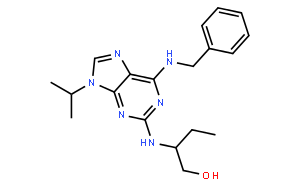| In vitro |
Roscovitine displays high efficiency and high selectivity towards some cyclin-dependent kinases with IC50 of 0.65, 0.7, 0.7 and 0.16 μM for cdc2/cyclin B, cdk2/cyclin A, cdk2/cyclin E and cdk5/p53, respectively. [1] Roscovitine reversibly inhibits the prophaselmetaphase transition in the micromolar range of starfish oocytes and sea urchin embryos, inhibits in vitro M-phase-promoting factor activity and in vitro DNA synthesis in Xenopus egg extracts, and suppresses the proliferation of mammalian cell lines with an average IC50 of 16 μM. [1] In mesangial cells, Roscovitine results in a dose-dependent reduction of CDK2 activity that at concentrations of 7.5, 12.5 and 25 mM, Roscovitine causes a 25, 50% and 100% decrease in CDK2 activity, respectively. [2] A recent study shows that Roscovitine inhibits cdk5 kinase activity, cell proliferation, multicellular development, and cdk5 nuclear translocation in Dictyostelium discoideum, without affecting the expression of cdk5 protein during axenic growth. [3]
|

 COA
COA MSDS
MSDS HPLC
HPLC NMR
NMR